Translations 677
Another Brick in Roger Waters’ Wall

Another Brick in Roger Waters’ Wall
Roger Waters, a former member of the rock band Pink Floyd, is one of the artists who stands up for noble causes. He will be eternally condemned by those who do not benefit from these revolutionary positions
Translated and edited by Walter Lippmann for CubaNews.
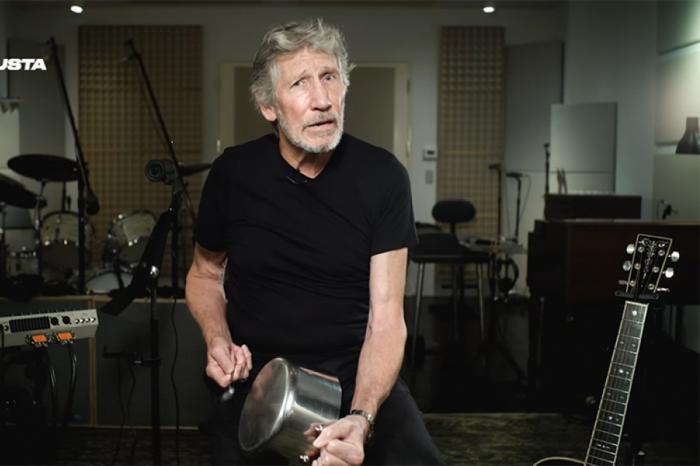
Roger Waters joined the Chilean people’s pots and pans. Photo: Taken from the Internet
It seems that the artists who stand up for the noble causes against massacres, racism, xenophobia, exploitation and other evils that coexist within humanity today, will be eternally condemned by those to whom these revolutionary positions do not favor them. Such is the case of Roger Waters, a former member of the rock band Pink Floyd, who has once again been criticized for opposing the genocide in the Palestinian-Israeli conflict.
The concerts of the British musician were being publicized by the website of Major League Baseball of the United States (MLB), which announced, last Saturday, March 8, that their platforms would stop promoting Waters’ performances, due to the pressures of the Zionist organization B’nai B’rith International. In January, in another attempt to silence the bassist, he had sent a letter to Rob Manfred, commissioner of MLB – the most important baseball league in the world – so that he would stop promoting the ticket sales for Waters’. This is not a Drill tour, scheduled to start on July 8, 2020.
The event that prompted such a reaction was the support of the British to BDS, a movement that drives the boycott policy, Boycott, Divestment and Sanctions against Israel.
The campaign promotes non-violence and advocates for the rights of the Palestinian population in Gaza and the West Bank, according to the Argentine newspaper Clarín.
It turns out that Waters, after announcing a tour of Tel Aviv in 2006, began receiving messages from one of the movement’s promoters. In this way, as he approached the conflict and its realities, he bet on supporting the Palestinians. Thus, in 2018, during his visit to Montevideo [Uruguay], the musician participated in the talk Palestine and Human Rights Today. In the same year, in Barcelona, he was present at the colloquium Totes per Palestina. The Palestinian rain and international solidarity, where the co-founder of Pink Floyd stated that all human beings should have inalienable rights such as freedom, beyond being European, African, Palestinian, Jewish or Muslim.
In his view, there is no “legitimate reason” to justify the massacres that have caused the death of not a few Palestinians on the border between Israel and the Gaza Strip. This conflict has continued to take lives since the last century and which, if it does not stop, will exterminate Palestinian culture and society.
However, this anti-Waters campaign is not only based on his position in the face of this conflict, but it is enough to sound out the British man’s social networks to realize that his fight is for peace and the defense of humanity. It’s a vision that makes some people uncomfortable, precisely because they are defending many. There are plenty of examples.
As part of the Desert Trip festival, which in October 2016 brought together several stars from the golden age of rock, Waters gave a finale that resonated throughout California and beyond. During his presentation, Donald Trump’s montages appeared on the screens, accompanied by his craziest phrases from his last campaign. Meanwhile, the song Pigs was playing. Then, Another Brick in the Wall was heard, while a huge inflatable pig, with the face of the American president, flew over the audience, who could read in the figure: “pig”, “ignorant”, “liar”, “racist”, “sexist”…
In February 2019, the musician spoke out against the US interventionist attempt in Venezuela, which was holding the Venezuela Live concert, with the support of British tycoon Richard Branson and Colombian President Ivan Duque. In October of that year, Waters posted a video on Instagram, where he chanted in support and solidarity with Chileans protesting against the government of Sebastián Piñera. And in 2020 he has spoken out against the extradition of Julian Assange to the United States.
While his music and ideas in support of humanity have no borders, these actions against Waters are just another brick in the wall.
There Will Not be Another Saint Louis

There Will Not be Another Shame for Cuba like the St. Louis
By Jorge Gómez Barata
March 18, 2020
Translated and edited by Walter Lippmann for CubaNews
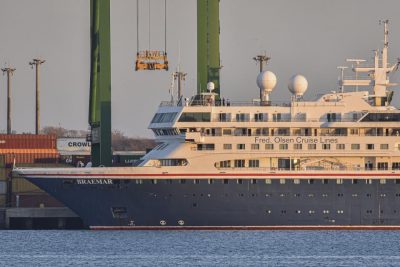 The news moved the ink: “Cuba authorized the docking of a cruise ship British with coronavirus…” According to Foreign Minister Bruno Rodriguez: “At the request of the British government, the Cuban authorities granted docking permission to the MS Braemar cruise ship, with some COVID-19 infected travelers on board. According to the minister: “This is a health emergency…
The news moved the ink: “Cuba authorized the docking of a cruise ship British with coronavirus…” According to Foreign Minister Bruno Rodriguez: “At the request of the British government, the Cuban authorities granted docking permission to the MS Braemar cruise ship, with some COVID-19 infected travelers on board. According to the minister: “This is a health emergency…
It later transpired that today, Tuesday the 17th, upon the ship’s arrival in the port of Mariel, a calibrated operation will be triggered as a watches to disembark all travelers, evaluate and offer medical care to the sick and airlift them to Gran Brittany.
It all started on Sunday, March 8th, when the cruise ship docked at the port of Cartagena, Colombia where, along with other passengers, an American woman landed. When examined at a center city doctor, she tested positive for the coronavirus.
Unaware of the situation, the cruise ship MS Braemar, set sail for Willemstad in Curaçao and Bridgetown in Barbados, where they were denied the entry. On Wednesday the 11th, the ship’s owner’s firm was notified of the passenger’s situation and immediately issued a statement in which he reported five other cases on board. The same day, the cruise captain asked the harbor master of Cartagena permission to return which was denied, which also happened with the Bahamas.
According to CNN, on Sunday afternoon, 15 British officials made intense and unsuccessful diplomatic efforts to find a country willing and with appropriate infrastructure to receive the ship in which 1,513 people are traveling. In addition to the British, among the passengers, there are Canadians, Australians, Belgians, Colombians, Irish, Italians, Japanese, Dutch, New Zealanders, Norwegians and Swedes.
On the ship, which at the time of the order was anchored 25 miles in the Bahamas, there are four passengers and one crew member positive for COVID-19. Other people, including a doctor, are subject to quarantine after presenting symptoms. In this case, it is for practical reasons because the cruise is about 4,000 miles from England where it would take several days to arrive and about 500 from Havana, so in about a day and a half of navigation the sick passengers will be under Cuban medical coverage and soon after, those who are re-marked, they will arrive in their country.
Although devoid of the dramatic and petty nuances, the situation of the cruise ship MS Braemar has reminded me of the tragedy experienced by the passengers of another ship, the St. Louis, which, in 1939, instead of to be welcomed in Havana, was rejected, so they ended up in the concentration camps and crematoria of Nazi Germany.
During World War II, in the face of persecution in Germany, there was an exodus of Jews to the United States. At that time there was a quota system for migrants that was not extended. In that context, there was an arrangement, according to which they would travel to a nearby country and wait there to be allowed to enter North America.
Under that understanding, in Hamburg, 937 passengers boarded the Saint Louis, which on May13, 1939 set sail for Cuba. All had permits to land in Havana with refugee status. On the 23rd of the same month, in the Cuban capital the captain received the news that the permits sold by a corrupt immigration director, were overruled by the president Federico Laredo Brú. Bru agreed to issue others at a cost of $500 dollars per person, an amount that only 29 passengers could pay.
In view of the refusal of the United States and Canada to take in the unhappy travelers, scarce water, food and fuel and with the crew virtually mutinous, the ship’s captain decided to return to Europe. In the port of Antwerp, Belgium, exhausted and terrified, the unfortunates of the St. Louis who lived the illusion of being welcomed into Havana.
According to reports, the British cruise ship will dock in the port of Mariel where directly, without any contact with the Cuban population, and, under strict medical and epidemiological supervision, will board buses to Terminal Five of the capital airport, which was destined and prepared for special operations, in which they will be taken by two planes chartered by Great Britain.
On social networks, in Cuba and elsewhere, both people who are bad intentioned as well compatriots acting in good faith, expressed critical opinions. It’s their right, but in this case, more than rights, it is the duty to assist others at risk, following rules that preserve the safety of the minimum number of people involved. COVID-19 shouldn’t make us any worse. See you there.
Movies and the Coronavirus

Movies and the Coronavirus
By Rolando Pérez Betancourt
March 16, 2020
Translated and edited by Walter Lippmann for CubaNews.
A few days ago, actress Gwyneth Paltrow appeared on social networks wearing a mask and this recommendation: “I’ve already been in this movie. Stay safe. Don’t wave. Wash your hands often.”
The film Paltrow was referring to is Contagion (Steven Soderberg, 2011), the most-watched on the Internet in recent weeks because of its similarity to that global scourge that keeps humanity against the wall, Covid-19.
Contagioun has a first-rate international cast: Jude Law, Marion Cotillard, Kate Winslet and Matt Damon, in addition to Paltrow, and is the film, within the genre of catastrophe, that most resembles what we’re experiencing, something like if since fiction its scriptwriter, Scott Z. Burns, had been sending out a warning message.

Gwyneth Paltrow has posted an image on Instagram recalling the film Photo: Instagram
In Contagion, Soderberg once again demonstrates his ability to combine experimental films with documentary elements and commercial touches, a formula that, through the use of breathless editing, opens the doors to vast audiences, while at the same time immersing the viewer in an atmosphere of tribulation.
The film talks about a virus that is supposedly transmitted from Hong Kong. Gwyneth Paltrow’s character, infected by a chef who shakes her hand after preparing a strange dish, later visits a casino where she blows the dice on a man who will die two days later. There he will contaminate everyone who approaches him, people who in a few hours will take planes to different parts of the world. On her way back to her native Minnesota, she falls ill and dies.
The epidemic takes on a global dimension and scientists begin to work on a vaccine, while the most diverse reactions take place in a film that gives great importance to the secondary characters: a blogger who denounces an international conspiracy that links the government with the pharmaceutical industry, cases of extreme selfishness, countries with no economic possibilities that are not involved in international cooperation, the manipulative role of the media and the lukewarmness, at the level of the nation and from the first moments, with which it faces what is happening.

Soderberg once again demonstrates in Contagio the ability to combine his experimental cinema with documentary elements and commercial touches Photo: sensacine.com
It is true that there are other films that deal with the subject, but none with the realism of Contagioun, hence the worldwide resurrection that makes many people look for it, and especially those people who remain in quarantine in their respective countries, perhaps because after long anguished suspense of anguish, the conflict opens the way to hope.
It is logical that in this “re-envisioning” the scriptwriter of Contagion, Scott Z. Burns, a faithful collaborator of Soderberg, returns to the foreground – with greater force than nine years ago. Interviewed by the website Slate, he had no qualms about condemning the cold actions of some governments in the face of the pandemic, starting with President Trump, who in the first moments relied more on his elusive messages via Twitter than on concrete actions.
According to Burns, while writing the script for the film, he went to meet with leading scientists who told him that the issue was not whether what he said could happen, but “when” it would happen. “When scientists say something, it’s better to listen,” the screenwriter said, and he had words of praise for the professionals at the U.S. Centers for Disease Control who advised him on his script. But he complained, “We’re finding out that we don’t have enough kits to test and for some reason, we’ve dissolved our pandemic response teams.
Speaking of the many people who tell him that the film was becoming a reality, Burns responds that he said, “I never imagined that there were leaders in this country who would leave us defenseless.
From a long interview appeared on the Slate website and an extensive lunge by Scott Z. Burns: “The administration and the Republican Party talk about protecting people with a wall [on the border with Mexico], but we don’t even have test kits. And he blames the lack of measures against hoarding, demonic price hikes, and other reprehensible aspects. “Where is the law when there are people on the Internet selling miracle cures?” he wonders. Those who saw the film remember the tricks of a grotesque con man in it, one more similarity of the many that come to show that, between fiction and reality, only the passage of life is in between.
Disinfecting Buses in Havana

Disinfecting Buses in Havana to Prevent COVID-19
By Ricardo López Hevia, Susana Antón Rodriguez
March 16, 2020
Translated and edited by Walter Lippmann for CubaNews.

They disinfect the buses in Havana. Photo: Ricardo López Hevia/Granma.
In a city like Havana that moves an average of one million people a day by bus, any measure taken to combat the new coronavirus might seem like little.
However, the Ministry of Transport (Mitrans) has implemented a series of actions aimed at increasing sanitation and preventive control in the Provincial Transport Company, which is responsible for the articulated and rigid buses that participate in the daily transfer of the population in the capital.
The measures, which began last Tuesday, also include the work centers and the arrival of each worker to the base units, said Raimundo Hierro Luna, deputy director of human resources of the company.
The process is established so that, once the “bus” arrives at the terminal, a team begins with the disinfection with chlorine solutions of the handrails, seats, doors and other surfaces.
The departure times of the transport will not be affected, because also at peak times, between each departure of the buses, there are 15 minutes for cleaning, explained Mauricio Mató Hernández, director of the Mulgoba Terminal.
Each time a bus completes a journey, at the rest time before returning, these measures are also being applied, and the people responsible are the driver and the conductor, who carry out the cleaning with the means given to them.

They disinfect the buses in Havana. Photo: Ricardo López Hevia/Granma.
Likewise, once the “cart” finishes the daily route and arrives at the base, a more meticulous cleaning is done to leave it ready for the next day.
The Provincial Transport Company of Havana has also published informative banners inside the buses, both rigid and articulated, so that the population is aware of the measures that must be adopted to prevent COVID-19.
This practice is implemented in each of the areas related to transport, such as the railways, the sea, and even aeronautics, as has been indicated to private transporters.
It is necessary to create a collective awareness of the importance of prevention, as each driver must be responsible for cleanliness and ensure compliance with the provisions of the COVID-19 confrontation in the Mitrans.
It is therefore up to the transporters to ensure the health of the Cuban people and to ensure, through hygiene and discipline, that all forms of transport are a guarantee of safety.
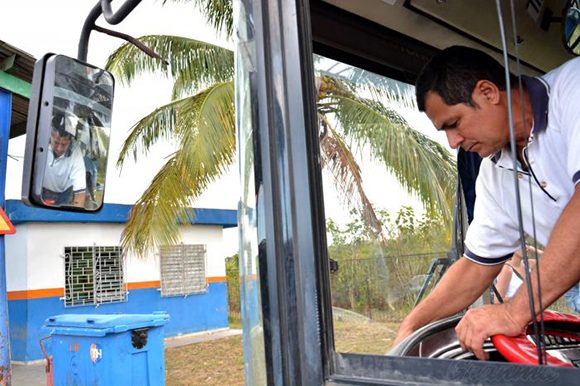
They disinfect the buses in Havana. Photo: Ricardo López Hevia/Granma.

They disinfect the buses in Havana. Photo: Ricardo López Hevia/Granma.

They disinfect the buses in Havana. Photo: Ricardo López Hevia/Granma.

They disinfect the buses in Havana. Photo: Ricardo López Hevia/Granma.

They disinfect the buses in Havana. Photo: Ricardo López Hevia/Granma.
Kissing Moratorium?

Kissing Moratorium?
In an era marked by virtual affections, not very credible for the most part, the scourge of the coronavirus has put in greater trouble that which the French call poutous, bisouilles, becs, bisous, bécots…
By Enrique Milanés León
March 15, 2020
Translated and edited by Walter Lippmann for CubaNews.

This picture of a Chinese couple pulling down their masks to kiss has been very popular, in the midst of the spread of the virus. Author: EFE Published: 15/03/2020 | 12:04 pm
Amazed, the world put its hand on its mouth when, a few days ago, French President Emmanuel Macron and his wife Brigitte received the king of Spain at the Elysée Palace without giving them a hand or a gift – bonjour with bonjour and cheek with cheek – the bise, that double portion of kisses so dear to the so-called land of love. The host couple chose to bow slightly with their hands and throw love into the air to Doña Leticia.
The anecdote may encapsulate the evolution of a planetary medical history because, just a week ago in Naples, Macron himself had had no qualms about putting a pair of pecks on the face of Italian Prime Minister Antonio Conte, a gesture with which, it is said, at the same time, sent a message of security to their citizens in times of uncertainty.
In an era marked by virtual affections, most of which are not very credible, the scourge of the coronavirus has put in a greater predicament what the French call poutous, bisouilles, becs, bisous, bécots… in short, kisses. There and here, certain contexts of doubt, between acceptance and rejection, leave many attempts in the frustration of the grimace.
A powerful and highly respectable woman, none other than Germany’s Federal Chancellor Angela Merkel went through the motions this week of being denied her hand by her own Interior Minister at a meeting, while across the Channel Queen Elizabeth II wore long white gloves for the first time in a ceremony at Buckingham Palace.
The issue is global, but in France, where the kiss is something of a national attribute, it must hurt more. It is easy to imagine that the Minister of Health, Olivier Véran, the public call to stop kissing must have seemed almost like a dictatorial act.
Such is the colorfulness of this practice that the French themselves sometimes don’t know if it’s right to give two kisses, as they do in Nice and Paris, or three and even four, as they’re used to in Montpellier. Who would have seen a Cuban there, with a shopping bag!
The famous Parisian centers of joyful life have also been impacted. At the Mask Club, for example, you cannot get into the bedroom without using hydroalcoholic gel and wearing a convenient mask, either expensive lace or the common surgical version.
Even the Tinder dating application, with some 50 million users who often venture into real contact, had to put on the mask on and warn its customers that “protecting yourself from the coronavirus is more important”.
They are distant prints that give the idea of how human contact looks in this particular context of humanity. German experts advise suspending the strong handshake that, from the schools, has always been promoted as a sign of strong personality. The British and Italians also propose to leave aside those expressions of appreciation that so many earthlings germinate, generous, by the hands and the lips.
There is indeed a moratorium on kissing. In Beijing, red posters advise against squeezing and propose to replace them with the traditional gong shou; that is, to put the palm on one’s fist as a sign of aseptic “hello!
Ravaged by the coronavirus, in Iran they defend the motto “I do not shake your hand because I love you” and men choose to approach, without reaching the contact, a closed fist to the equally tight fist of the friend. And almost at the end of the world, in New Zealand, the practitioners left aside the hongi, the traditional Maori greeting that consists of joining noses and fronts.
In Cuba… in Cuba you can see everything. Just a couple of days ago, at an event of colleagues, I found myself in the same space with some who kept me at a distance, at the distance of a musketeer, and others who embraced me, in a frank bid for the “affectovirus”. As far as the Ministry of Public Health is concerned, which is everyone’s best friend, each personal picture is an interesting page.
There is no other way than to join in this battle that is also being fought for the massive return of kisses. The world cannot live without them, so, as the measures are temporary, it is advisable to make a stockpile for when the “thing” is fixed. Let’s hope that by July 6th, International Kissing Day, the epidemic will be a tamed jíbaro and, without a virus crown or a king’s crown, the common people of humanity will take to the streets to celebrate… simply by kissing.
Cuban Cartoonists Confront Coronavirus

Cuban Cartoonists Confront Coronavirus
Cuban cartoonists fight paranoia with what they know how to do: good humor. But, of course, laughter with nasobuco in it… [nasobuco is a Cuban word for facemask]
March 15, 2020
Translated and edited by Walter Lippmann for CubaNews.

Cuban cartoonists propose another way to face the virus: laughing, but with nasobuco Author: Falco Published: 15/03/2020 | 12:18 pm

Granma, what a big mask you have!
The better to protect us.
 Yesterday I travelled from a bill to a counter, from there followed a tube on a bus, then ended up on the keyboard of a computer!
Yesterday I travelled from a bill to a counter, from there followed a tube on a bus, then ended up on the keyboard of a computer!
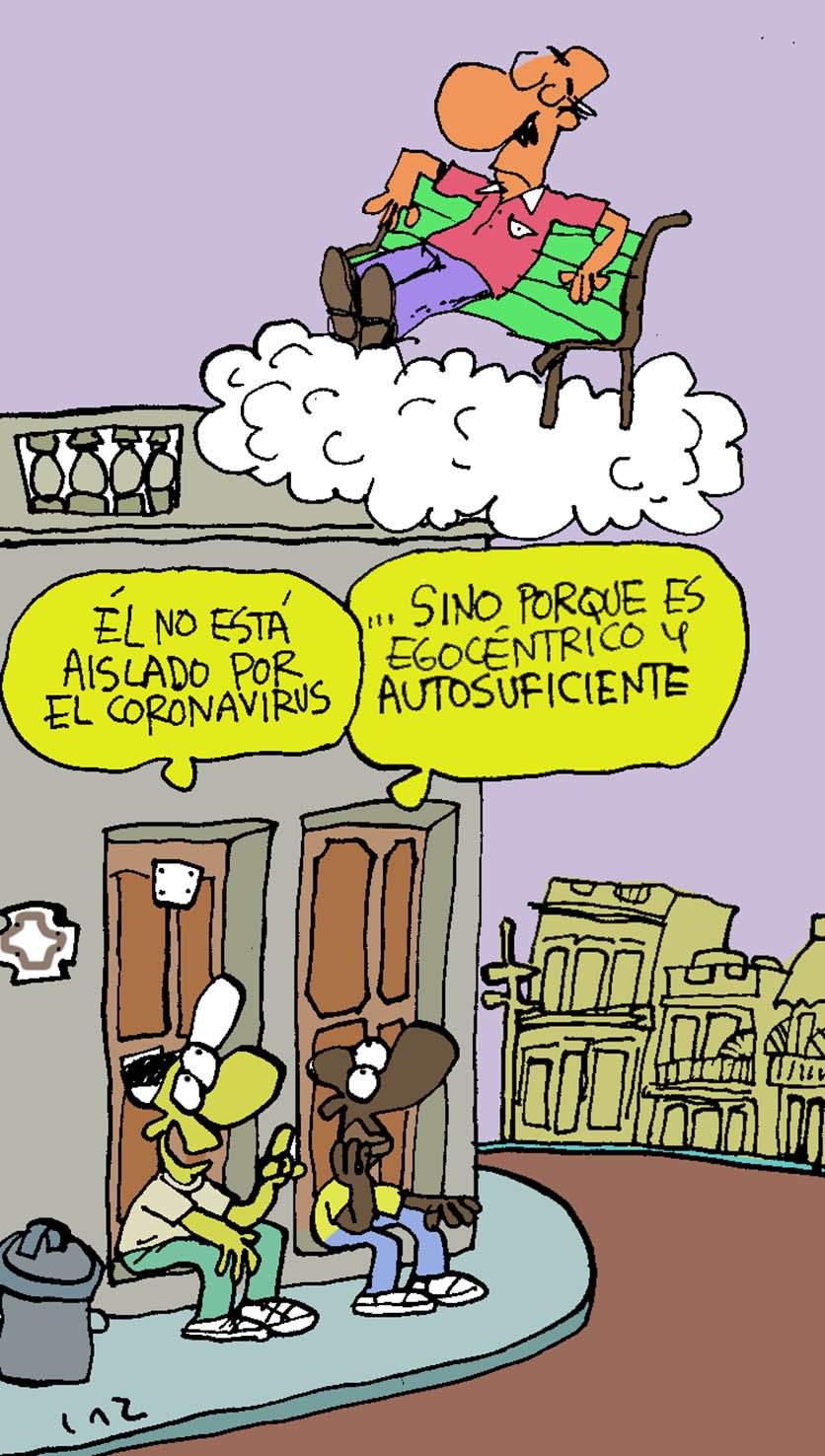
He’s not isolated because of the coronovirus, but because he’s egocentric and (too) self-sufficient
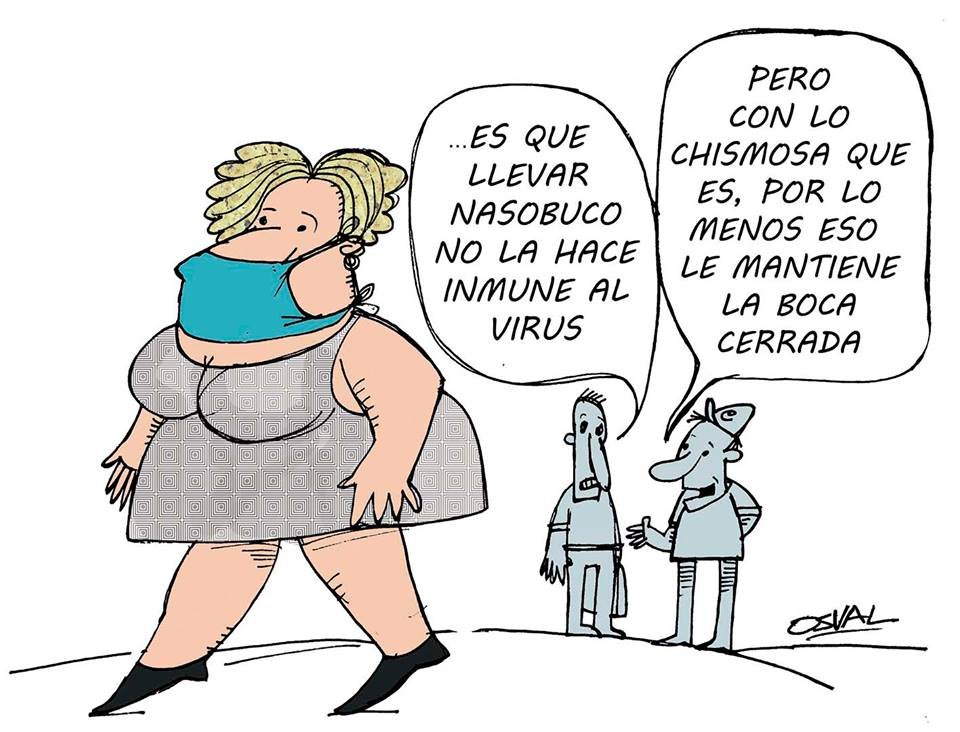
Wearing the mask doesn’t make her immune to the virus
But with a gossip like her, at least it’ll keep her mouth shut.
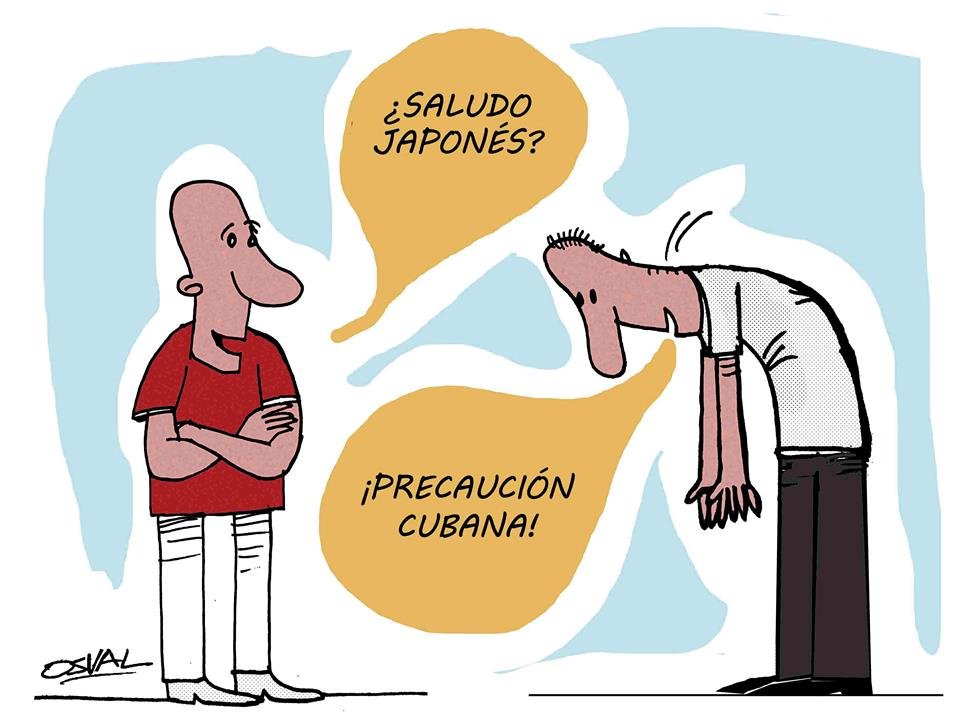 Japanese Greeting?
Japanese Greeting?
Cuban Caution!
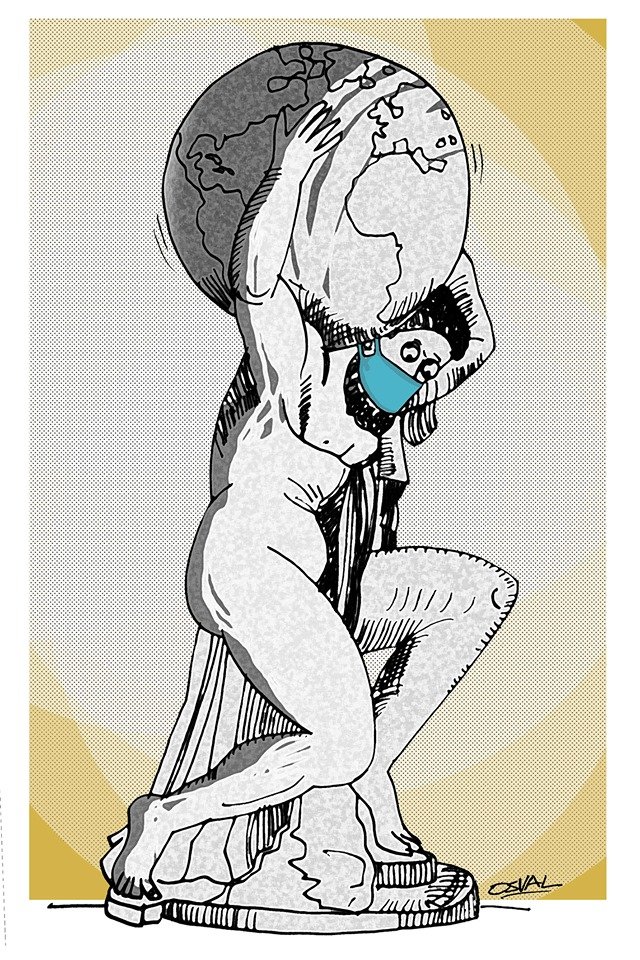
(No caption)
Cuba Rejected Jewish Refugees in 1939

SS Saint Louis:
Under U.S. Pressure, Cuba Turned its Back on 909 Jewish Refugees in 1939
This is the heartbreaking story of the passengers of the SS Saint Louis liner, who in order to escape persecution by the Nazis, decided to travel to Havana, and then to the United States, but upon arrival at the Cuban port, under pressure from the U.S. government, were denied
—————————————————————————————————
Author: Dolphin Xiqués Cutiño | archivo@granma.cu
March 17, 2020 13:03:41
Translated and edited by Walter Lippmann for CubaNews.

The SS Saint Louis leaving the port of Havana on June 2, 1939, when the Jewish refugees were denied landing. Photo: Carteles Magazine
This is the heartbreaking story of the 937 passengers of the SS Saint Louis liner, who in order to escape the persecution by the Nazis, decided to travel to Havana, and then to the United States, but upon arrival at the Cuban port, under pressure from the Yankee government, were denied disembarkation.
Most of the passengers were Jewish families who, with the arrival of the Nazi party to power, began to be harassed: Their synagogues and properties were burned, they were constantly harassed and, moreover, they risked being detained only because they were Jews.

937 Jews fleeing the Nazi repression were shipped to the port of Hamburg. Photo: Taken from the Internet
Also traveling were four Spaniards and two Cubans who were not Jews. Almost all of them carried their visas in order issued by the Cuban Embassy in Berlin at a cost of $200 or $300 each, a fortune at that time.

The passengers of the SS Saint Louis were traveling with the illusion of reaching Cuba and then the United States, but that did not happen. Photo: Taken from the Internet
The SS Saint Louis set sail from the port of Hamburg on May 13, 1939. Gisela Felman was 15 years old when she embarked on that unknown adventure and “she remembers her father begging her mother to wait for him but she was tenacious and always replied: I have to take the girls away for safety.”
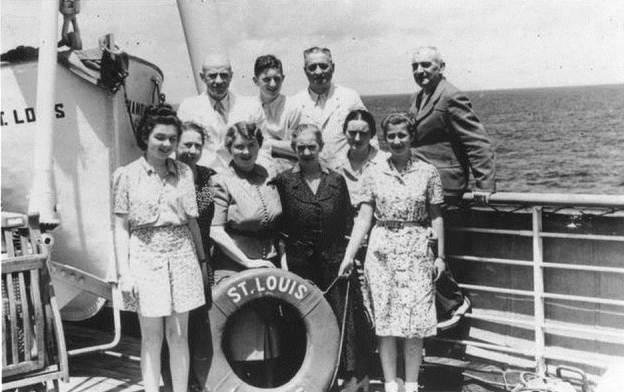
The families enjoyed the trip without suspecting that they would be rejected in Cuba, in the United States and in other Latin American countries. Photo: Taken from the Internet
“So, armed with visas for Cuba acquired in Berlin, 10 German marks in their bag and another 200 hidden in their underwear, they headed for Hamburg and the St Louis.
The voyage took place with the usual normality of passenger ships. Games, dances, dinners, walks on deck and that its captain Gustav Schroder kept so that women, men and children could enjoy the comforts on board, knowing that those families had suffered enough on German land.
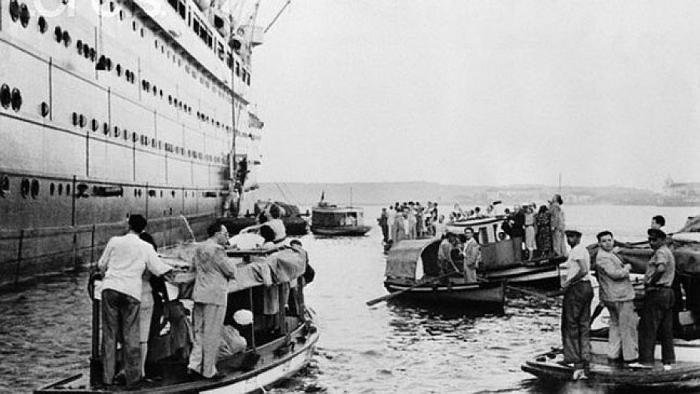
The Havanese were very supportive of Jewish immigrants. Photo: Taken from the Internet
Everything was ready for the passengers to disembark. But big was the surprise when the authorities showed up on board the ship and informed the captain that nobody could go ashore.
The Jewish immigrants were unaware that eight days before the departure of the ship from Hamburg, the then president of Cuba, Federico Laredo Bru, under pressure from the Yankees, had denied the landing permits by means of a decree. Now, in order to enter Cuba, it was required to have an authorization from the Secretary of State and another from the Secretary of Labor and to pay a $500 bonus, except for the tourists.
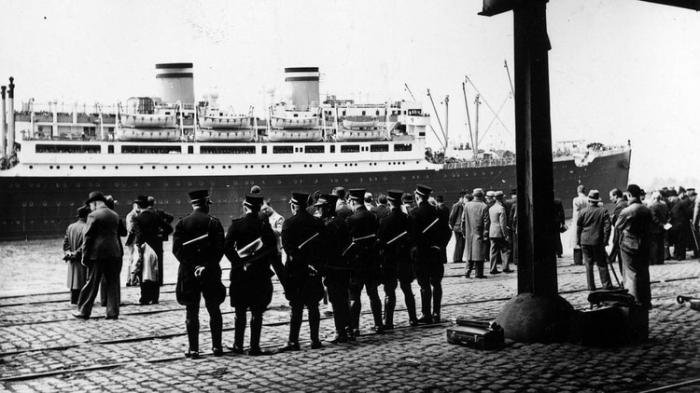
The SS Saint Louis in the port of Antwerp, Belgium, after sailing for almost a month through Latin America without getting any country to accept its passengers. Photo: Taken from the Internet
Of course, the Jewish refugees could not comply with the new entry regulations because they had left Germany with what little value they had left. And now they had nothing of value with them, only their lives.
Only 28 passengers were able to disembark without problems, including the four Spaniards and the two Cubans.
The SS St. Louis remained in the Havana watershed for almost a week while the lives of the 909 Jewish refugees were traded as if they were just another commodity. They were fleeing from Nazism and were caught by capitalism.
On June 2, President Laredo Bru ordered Captain Gustav Schroder to leave the port of Havana. As the ship was leaving, thousands of Havana residents came to see them off, offering their solidarity and thus showing that the Cuban people were with them.
The ship set sail escorted by two Navy boats and set course for Florida, but there they refused to receive them as they did in Puerto Rico. The captain then telegraphed the authorities in Canada, Honduras, Venezuela, Ecuador, Chile, Colombia, Paraguay, and Argentina, among other countries, to persuade them to take in the Jewish immigrants, but they all refused entry.
Almost a month after his departure from Germany, the SS Saint Louis had to set out for Europe and after long conversations some Jews were accepted by Great Britain, Holland and France, confining them in internment camps. The remaining passengers disembarked on June 17, 1939, in Antwerp, Belgium.
The epilogue to this heartbreaking story goes back to the German invasion of western Europe in May 1940: approximately 670 SS Saint Louis refugees were caught by the Nazis and died in concentration camps. Some 240 survived years of starvation, abuse, and forced labor.
Sources:
Cartel Magazine, June 11, 1939
Juventud Rebelde, March 29, 2009
Love in the Times of the Coronavirus

Love in the Times of the Coronavirus
By Carlos Lazo
Professor, creator of the Dream Factory project.
March 15, 2020
Translated and edited by Walter Lippmann for CubaNews.
This essay was originally posted to Facebook by its author.

We don’t want walls that separate us, but bridges that unite us. Photo: Carlos Lazo/Facebook.
Sisters and brothers who live in Cuba: we do not hate them. In fact, the vast majority of us Cubans who live in other countries love the Cubans who live in our land deeply. I often receive messages from compatriots on the island who ask me why the resentment of those who left against those who stayed is so strong. This question is supported, in part, by what they see on the Internet. Much of what is published on social networks is saturated with resentment and cruelty towards our people. But this is not the case. We Cubans who live abroad love and do not forget the family, friends and neighbors who live in our land. This relationship transcends ideologies.
But I understand why so many ask me the same question. There is a small part of the Cuban community abroad that exacerbates hatred and promotes punitive measures against our people. This group of brothers and sisters seeks to increase the pain of the Cuban family inside and outside of Cuba. Although reduced in number, they are complicit in the cruel restrictions implemented by the United States government that penalize Cubans here and there.
They devised and supported the cancellation of trips by U.S. airlines to airports in the interior of the island. They publicly advocated the prohibition of remittances from third countries to Cuba. They express it loudly; not only do they oppose the family contacts between the two shores, but they demand that the son who emigrated, stop helping the old mother who stayed on the Island. Some even speak of a naval blockade and even an invasion. Given this reality, it is logical that many Cubans inside Cuba have the perception that their compatriots outside Cuba want the holocaust of the Cuban people.
Right now, confronted with the global pandemic that the planet is suffering, several of those people have publicly expressed their desire for the coronavirus to wipe out the land of their birth. It is painful to see how they say it in public, on the social networks, jubilant and mocking in the face of the misfortune of others. Taking the containment of the virus as a justification, voices are heard that even advocate the total cancellation of flights between Cuba and the United States. Ironically, nations such as Brazil, Mexico, the Dominican Republic and others have already reported dozens of cases of the epidemic. However, nobody is asking for the closure of flights to those countries, but they are demanding the liquidation of trips between Miami and Havana! They have not been able to completely sever the ties between the Cuban family here and there and are now manipulating the fear of the epidemic to achieve their goals.
Compatriots of Cuba, for every brother who is confused or sick with a grudge, there are thousands of us who believe in love. We love the adopted country that one day received us with open arms, but we also love the motherland that gave us life. Instead of punitive measures that intensify suffering, we advocate cooperation between our nations. We do not want walls that separate us but bridges that unite us.
As for us; we are not a pack of wolves. As a people, we have a common destiny and a duty: to help each other in misfortune. But even if hatred were to rob us of our tenderness and turn us into a pack, we would still do anything to save our cubs, which are the Cuban children for whom we are responsible.
And if, in the worst case, an epidemic of oblivion were to strike us, if we were all to end up demoralized – those here and those there – orphans of humanity and transformed into wolves, even then, an ancestral instinct of homeland and love would rise up from our hearts to remind us of the unforgettable: that we are members of the same pack!

They have not been able to completely sever the ties between the Cuban family here and there and are now manipulating the fear of the epidemic to achieve their goals. Photo: Carlos Lazo/Facebook.
No One Can Ever Bury Marx

No One Can Ever Bury Marx
There is no Marxist who knows Marx’s work inside out and does not fight for social justice; if one rationally assumes his postulates, but does not vibrate in the face of injustice committed against other human beings, in any corner of the planet
by Enrique Ubieta Gómez
March 14, 2020
Translated and edited by Walter Lippmann for CubaNews.

Illustration dedicated to Karl Marx Photo: Archive illustration
There is a drawing that imitates a photo, Karl Marx appears in a pitusa, a red pullover and leather jacket. Under his arm, he carries a volume of his masterpiece: Das Kapital. The Genius of Trier looks at us as he walks, impatient. The poster bears a legend, written in English and Russian: “I am back”. In another poster, Marx himself, now full-length, appears with a couple of university students; the professor and his students are almost dressed alike. This is recent propaganda by the Russian Communists. They’ve made one of Lenin’s as well. Sitting down, he holds a modern laptop on his knees and feverishly writes one of his revolutionary articles. The drawings connect, no doubt, with young people. They are doors that invite to be crossed.
On March 14, 137 years ago today, the greatest social thinker in history physically ceased to exist. His mark on modern culture is so profound that it is not necessary to know his work in depth to breathe its air. Humanity, whether it knows it or not, has assimilated many of his discoveries, just as, without having read or studied Copernicus or Darwin, it “knows” that the Earth is round and understands that evolution is a key factor in nature. The intellection of his work is, however, arduous: it demands dedication, study. Marx set out to understand capitalism, and he discovered its fundamental laws, in force despite its changes. He also discovered the path to overcome them. From a theoretical point of view, he was a man of action. But we are not given in simplifying capsules, nor in manuals.
His work demands active readers, creators. It demands native revolutions, capable of readjusting their paths, time and again, as Martí requested, in order to avoid the sieges and traps of Capital, its military, financial and media tentacles, and to conquer spaces of freedom, anti-colonial at first, and anti-neocolonial later. Fidel explained it as follows: “Marx’s theory was never a scheme: it was a conception, it was a method, it was an interpretation, it was a science. And science is applied to each concrete case. And no two concrete cases are exactly the same. The Cuban Revolution had the genius of Fidel, and a well-established tradition, whose roots go back to the independence and anti-imperialist thinking of José Martí and Antonio Maceo. It extends through a long list of combatants in the 20th century: Carlos Baliño, Julio Antonio Mella, Rubén Martínez Villena, Antonio Guiteras, Jesús Menéndez, Frank País, Ernesto Che Guevara…
There is no Marxist who knows Marx’s work inside out and does not fight for social justice. if one rationally assumes its postulates, but does not vibrate before injustice committed against other human beings, in any corner of the planet.
Ethics and science are basic assumptions. That is why in 2001 Fidel reaffirmed: “We will never renounce the principles we acquired in the struggle to bring all justice to our country by putting an end to the exploitation of man by man, inspired by the history of humanity and by the most preclarified theorists and promoters of a socialist system of production and distribution of wealth. It is the only one capable of creating a truly just and humane society: Marx, Engels and later Lenin. 137 years ago today, Karl Marx physically abandoned us. But no one will ever be able to bury him.
Bernard Sanders and the Ides of March

Bernard Sanders and the Ides of March
 By Ramón Sánchez-Parodi Montoto
By Ramón Sánchez-Parodi Montoto
He was appointed head of the Cuban Interests Section in the United States, between September 1977 and April 1989. He then served as Cuba’s deputy foreign minister until 1994. And from then on he served as Cuban ambassador to Brazil, until 2000. In addition to his activities as a Cuban government official, Sánchez-Parodi is a journalist and writer.
March 13, 2020
Translated and edited by Walter Lippmann for CubaNews.

Sanders and Biden vying for the Democratic nomination.
The results of the primary on March 10 certainly point to Joseph Biden becoming, in less than two weeks, the absolute frontrunner among the Democratic contenders for the highest office in the United States. Biden is now assured of the necessary and sufficient conditions to accumulate the support of the 1,991 delegates that will guarantee him to be proclaimed on the first ballot at the Democratic National Convention (July 13-16 in Milwaukee), as the Democratic Party candidate for the presidency of the United States.
Senator Bernard Sanders, the only other contender still active in his presidential bid, has only an open arithmetic probability of accumulating the number of delegates to be nominated as the Democratic Party’s candidate. Since that option is practically unattainable, Sanders has only to give up his aspiration. Therefore, the question to be solved is how and when Sanders will give up his electoral efforts. That decision will be the result of discussions and negotiations, not necessarily public, between both campaign teams, the two challengers and the Democratic leadership.
Among the issues to be considered in these decisions is the time factor, which has begun to run since the March 10 primary results, especially in Washington and Michigan. [These are] states where Sanders was unable to repeat the magnitude of his 2016 primary victories over Hillary Clinton. This decision is important. Once it is made, it will change the pace and content of the election campaign because the cross-party confrontation will be over and the confrontation will be between the Republican Party and the Democratic Party, and particularly between Donald Trump and Joseph Biden.
Of the six states that held primaries on Tuesday, March 10, Biden won three of them by an absolute majority: Michigan (52.9%), Missouri (60.1%) and Mississippi (81%). He also won in Idaho with 48.9% of the vote and a lead of nearly seven thousand votes.
Michigan is a state in the north-central part of the country and will be one of the most disputed states next November. Sanders had won it in the 2016 primaries against Hillary Clinton, when he beat her by winning 49.68%, with a lead of about 18,000 votes. [This time] Biden beat Sanders by more than half a million votes and more than 16%. In Missouri, Biden received 60.1% of the vote against 34.6% for Sanders and a lead of about 170,000 votes. In Mississippi, a state with a very large African-American community, Biden won with 81% of the vote, which is equivalent to more than 160,000 votes.
The results of the Washington primary were disappointing for Sanders. There he had defeated Clinton in 2016 when the election was held in the form of a caucus with 72.72% of the votes. Now he won again, but by a slim margin of 0.2%. The other victory was in North Dakota, which only brings a total of 14 delegates to the National Convention. The victory (if you can call it that) was by a margin close to 14% and less than 2,000 votes ahead: By 2016 Sanders had won that state by about 19%.
With these results, the idea is gaining ground in the minds of Democrats that the goal to be achieved in the November election is to prevent Trump’s reelection, putting aside differences over the electoral agenda on issues such as health care; the establishment of a tax on the rich; the solution of the problem of the university debt; the changes in the national security system and other measures proposed by the “progressives”, “socialists”, “communists” (choose the adjective that you find most convenient and appropriate) that the representatives of the “establishment” consider “radical” and “threatening” to society.
In fact, the results of the primaries held on February 29, March 3 and March 10 are a direct effect of the fears that the dominant sectors within the Democratic Party had about the possibility that Bernard Sanders could accumulate enough delegates to be nominated as a candidate for the presidency in the elections next November. In the last two weeks, we have witnessed an incessant media campaign and political pressure on the various Democratic groups to close ranks and “stop” Sanders.
The problem for the Democratic leadership is how to make this campaign bear fruit in November by transforming it into a mass movement to express at the polls the will to prevent Trump’s re-election.
For now, we can only wait for the “dust” of this political storm to settle so that we can glimpse the future of the current U.S. election campaign.
Subscribe to Blog via Email
| M | T | W | T | F | S | S |
|---|---|---|---|---|---|---|
| 1 | ||||||
| 2 | 3 | 4 | 5 | 6 | 7 | 8 |
| 9 | 10 | 11 | 12 | 13 | 14 | 15 |
| 16 | 17 | 18 | 19 | 20 | 21 | 22 |
| 23 | 24 | 25 | 26 | 27 | 28 | |


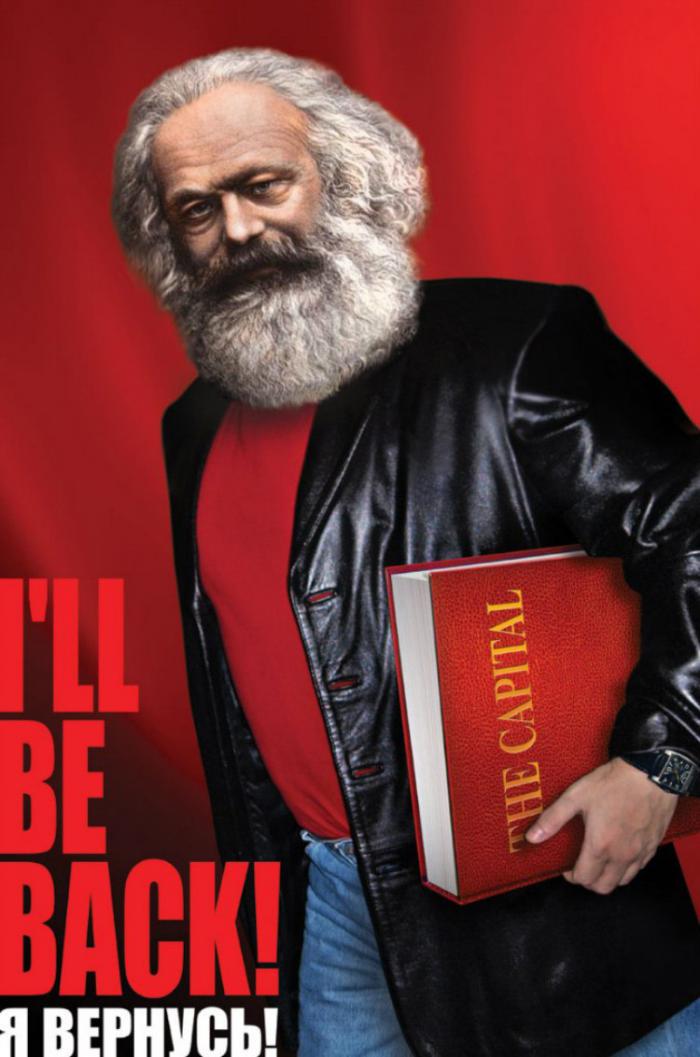
You must be logged in to post a comment.